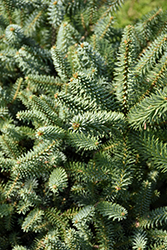It's all about ...
plants

Prostrate Blue Spanish Fir
Abies pinsapo 'Glauca Prostrata'
Height: 3 feet
Spread: 7 feet
Sunlight:
![]()
Hardiness Zone: 7a
Other Names: Glaucous Spanish Fir
Description:
This is a dense evergreen with a low prostrate branching structure; its steel blue color makes it an attractive, low growing landscape addition; drought tolerant once established, and prefers to be sheltered
Ornamental Features
Prostrate Blue Spanish Fir is a dwarf conifer which is primarily valued in the garden for its broadly spreading habit of growth. It has attractive grayish green foliage with hints of steel blue which emerges light green in spring. The needles are highly ornamental and remain grayish green throughout the winter. The purple fruits are held in cones from late summer to late winter.
Landscape Attributes
Prostrate Blue Spanish Fir is a dense spreading evergreen shrub with a ground-hugging habit of growth. Its relatively fine texture sets it apart from other landscape plants with less refined foliage.
This is a relatively low maintenance shrub, and usually looks its best without pruning, although it will tolerate pruning. It has no significant negative characteristics.
Prostrate Blue Spanish Fir is recommended for the following landscape applications;
- Accent
- Mass Planting
- Rock/Alpine Gardens
- Groundcover
- Naturalizing And Woodland Gardens
Planting & Growing
Prostrate Blue Spanish Fir will grow to be about 3 feet tall at maturity, with a spread of 7 feet. It tends to fill out right to the ground and therefore doesn't necessarily require facer plants in front. It grows at a slow rate, and under ideal conditions can be expected to live for 50 years or more.
This shrub should only be grown in full sunlight. It does best in average to evenly moist conditions, but will not tolerate standing water. It is not particular as to soil type, but has a definite preference for acidic soils. It is quite intolerant of urban pollution, therefore inner city or urban streetside plantings are best avoided, and will benefit from being planted in a relatively sheltered location. Consider applying a thick mulch around the root zone in both summer and winter to conserve soil moisture and protect it in exposed locations or colder microclimates. This is a selected variety of a species not originally from North America.
This plant is not reliably hardy in our region, and certain restrictions may apply; contact the store for more information.
